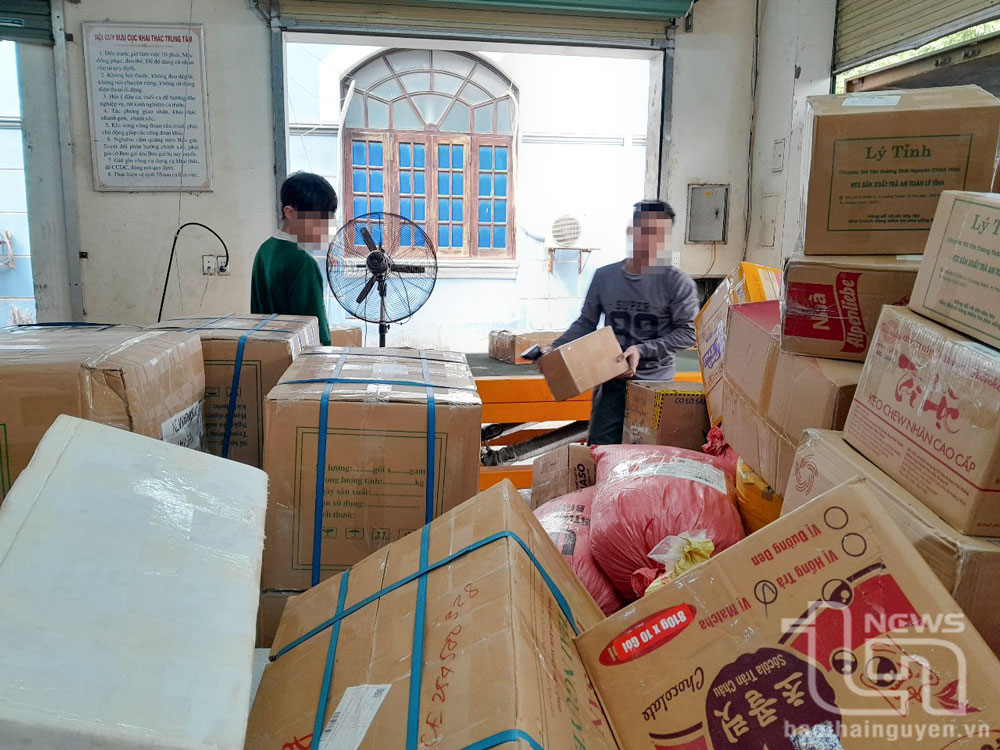 |
| Loading, unloading, and transporting goods at the Thai Nguyen Provincial Post Office . |
One day in mid-June, Ms. LTH, residing in Tuc Duyen ward (Thai Nguyen City), went to the Thai Nguyen City Central Post Office to send packages to three friends in Bac Ninh , Nghe An, and Thua Thien Hue provinces. These were small, simple gifts. All procedures were carried out legally, and Ms. H. had paid the shipping costs in full at the post office. It seemed like everything was over, but just one day later, all three friends unexpectedly received calls from unfamiliar numbers: 0984126865; 0903784374; 0328833178. The content of the calls was identical, with an urgent tone: "You have an order sent from Thai Nguyen, but you need to transfer 12 to 16 thousand dong in advance to create a warehouse release order. This is a new regulation of the post office; if you don't transfer the money, the order will be canceled." A small, insignificant amount of money, yet it easily leads the recipient to be complacent and trusting.
All three of Ms. H.'s friends cautiously called her back to verify. Upon learning that all expenses had been paid in advance and there were no provisions for additional "delivery" fees, they quickly recognized the signs of fraud and did not follow the scammer's instructions.
Impersonating postal workers to collect fees via phone calls is nothing new, but the prevalence and sophistication of these scams have increased significantly. Exploiting people's unsuspecting nature, these scammers often request small amounts, just a few tens of thousands of dong, to avoid suspicion. Notably, this tactic is not limited to phone calls; it also occurs via text messages, social media platforms, and even email.
Furthermore, some victims in the province shared with us that after placing orders through several shopping websites (which provided addresses and phone numbers), they received fake messages and calls impersonating sellers, asking them to click on links to confirm orders or upgrade to VIP membership for discounts. However, these were actually malicious links designed to steal bank account information or take control of their phones. As a result, some victims lost money from their accounts immediately after accessing the suspicious links, while others lost access to social media accounts such as Facebook and Zalo, and were scammed into messaging their friends list asking for loans.
Such incidents not only cause public concern but also raise questions: Where did customers' personal information get leaked from? How do businesses protect customer information? Are shipping companies, especially the postal system, which is supposed to store and protect customer information, truly secure enough?
Speaking with us, Ms. Nguyen Thuy Ngoc, Deputy Director of Thai Nguyen Provincial Post Office, affirmed: The Post Office does not collect any fees from recipients before the goods arrive. Any calls requesting payment in this manner are acts of impersonation and fraud. In response to this situation, we have implemented software to hide customer information on our internal system, and we also do not display the phone numbers of the sender and recipient to prevent exploitation.
It is clear that the sophistication of scams is posing information security challenges to society, and this is no longer a matter for any individual or organization, but a shared responsibility of the entire digital ecosystem. Transportation companies need to tighten security procedures, improve inspection and monitoring capabilities, especially in areas that come into contact with user data.
Simultaneously, citizens themselves need to change their mindset regarding the protection of personal information. They should avoid sharing phone numbers, addresses, and account information on unofficial platforms, refrain from transferring money to strangers, and avoid clicking on suspicious links. When receiving calls requesting money transfers, citizens should calmly verify the information through official channels before taking any action to avoid unnecessary risks.
In this context, the postal industry not only needs to innovate its technical infrastructure to prevent information leaks, but also needs to be more vigilant in data storage processes, strengthen internal supervision, and take more decisive action to build a safe, transparent, and reliable transaction environment.
Source: https://baothainguyen.vn/xa-hoi/202506/khi-don-hang-tro-thanh-cau-noi-lua-dao-cfc308f/






![[Photo] General Secretary To Lam attends the opening session of the Peace Council on Gaza.](https://vphoto.vietnam.vn/thumb/1200x675/vietnam/resource/IMAGE/2026/02/19/1771516865192_tbttolam5-jpg.webp)





































































































Comment (0)